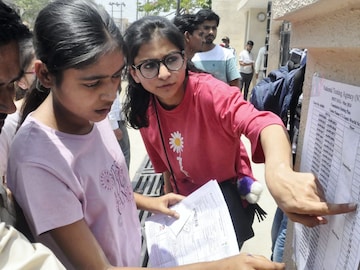SOURCE ; NEW18
Last Updated:January 16, 2025, 23:53 IST
Last month, a Centre-appointed expert panel had recommended major reforms in conducting entrance exams, including moving to completely online or hybrid mode as well as multilevel system for NEET-UG
Candidates for NEET-UG 2024 check a notice board for their allotted seats at an exam centre. (Image: PTI/File)
In a shift from the entrance exam reforms recommended by a Centre-appointed expert panel, the National Testing Agency on Thursday said it will continue to conduct the NEET-UG in pen-and-paper mode in 2025 in a single day and single shift.
The move is significant since the National Entrance-cum-Eligibility Test (Undergraduate), or NEET-UG, ran into major allegations of irregularities and leaks last year, which put the future of lakhs of candidates at stake. The controversy delayed the counselling process for seat allocation by at least two months.
related stories
Last month, an expert panel appointed by the central government released its report recommending major reforms in conducting entrance examinations, including NEET-UG. These recommendations included moving to completely online or hybrid (in case online mode was not possible) for the test as well as a multilevel system for NEET-UG.
In June last year, the Centre had appointed a seven-member committee headed by former ISRO chief K Radhakrishnan to suggest reforms for transparent and error-free conduct of entrance exams.
‘NATIONAL MEDICAL COMMISSION DECIDED ON PEN-PAPER MODE’
According to the notification issued by the National Testing Agency (NTA), the National Medical Commission (NMC) decided on conducting the NEET-UG in “pen and paper mode (OMR based) in single day and single shift”.
Since 2019, the NTA has been conducting NEET-UG on behalf of the NMC. As per Section 14 of the NMC Act, 2019, NEET-UG is conducted as a common entrance exam for admissions to undergraduate medical education in all medical institutions. The commission then conducts the counselling process (allocation of seats) in medical colleges based on the NEET score.
Government officials said the NMC has made this decision, which the NTA does not have a say. The testing agency is an autonomous body under the ministry of education (MoE) that conducts at least 15 major all-India entrance tests including NEET-UG, JEE-Main and UGC-NET among others.
On January 14, the NTA issued an advisory for candidates applying for NEET-UG 2025 to use the automated permanent academic account registry (APAAR) ID for registration to enhance transparency, efficiency and security. It urged candidates to use both this ID as well as Aadhaar-based authentication during the application and examination process.
DECISION SPARKS CONCERNS OVER PROMISED REFORMS
The NTA’s announcement led to concerns being raised by students and academic bodies on the conduct of the examination.
Keshav Agarwal, president of Educators Society and member of the Coaching Federation of India, said the notification raises questions on the reforms promised amid much anticipation of a fair system, which defeats the purpose of setting up the expert panel.
“The latest notification reflects no such reforms as suggested, leaving the examination format unchanged. This raises a pressing question: what was the purpose of forming the committee if its recommendations have not been implemented? The lack of visible reforms has reignited concerns about the credibility of the examination system and the accountability of the authorities responsible for conducting it. For thousands of students who dedicate years of hard work in pursuit of their medical dreams, the absence of meaningful changes is both disappointing and disheartening. It is imperative that the NTA and concerned authorities take decisive steps to restore trust in the examination process and ensure a fair and secure system for all aspirants,” he said.
Sumit Sharma, a Delhi-based parent of a Class XII student, said both candidates and parents were hoping for a transparent system of entrance tests to come into force. “Everyone was waiting for the much-awaited and widely discussed reforms to come in from this year. But, the notification shows that it’s not to be implemented anytime soon. Then, why did the government make tall promises on a cheating-free exam system?” he asked.
WHAT WERE THE PANEL’S RECOMMENDATIONS?
The high-level committee panel had submitted its report to the education ministry in October last year. In its report titled ‘Reforming the national entrance testing in India’, there were some key recommendations – computer-based test (CBT) format for all entrance exams and hybrid model for places where complete online exams cannot be conducted; digital transfer of question papers in case of hybrid model; holding multi-stage exam for NEET-UG, akin to JEE; reducing the number of subject choices in CUET-UG; hiring permanent personnel in NTA instead of temporary staff; and limiting the number of outsourced/private centres and instead establishing new CBT centres in government-run institutions.
The experts had also suggested implementing a ‘Digi Exam’, similar to ‘Digi Yatra’, to reduce chances of impersonation and ensure that a candidate taking the test is the same as the one who registered for it. This system must involve Aadhaar, biometric verification, and AI-based data analytics to authenticate identity at different stages of the examination process.







